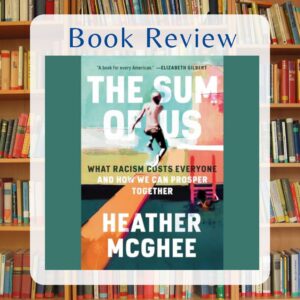
The Sum of Us: What Racism Costs Everyone and How We Can Prosper Together
By Heather McGhee
Book Review by Kristine Madera
 The core message of this well-researched book is that the often invisible, race-centered policies of the US government, state/local governments, and private enterprises, hurt not only people of color but all Americans. Since the inception of the United States, Heather McGee, who is an economist and public policy researcher, demonstrates how the wealthy and powerful have used racial hierarchies to turn people against one another to consolidate power and wealth at the top and drain it from everyone else. This works by presenting economic, educational, and other advancements by people of color as a zero-sum game that comes at the expense of Whites.
The core message of this well-researched book is that the often invisible, race-centered policies of the US government, state/local governments, and private enterprises, hurt not only people of color but all Americans. Since the inception of the United States, Heather McGee, who is an economist and public policy researcher, demonstrates how the wealthy and powerful have used racial hierarchies to turn people against one another to consolidate power and wealth at the top and drain it from everyone else. This works by presenting economic, educational, and other advancements by people of color as a zero-sum game that comes at the expense of Whites.
Her first poignant example are the 2000 massive public works community swimming pools built in the first part of the 20th century that could hold up to 1000 swimmers. They were free and paid for by public taxpayer money, including Black taxpayers, and open to everyone—as long as they were White. When the exclusionary policies were challenged in court and struck down, municipalities either privatized the pools so that they could legally exclude Blacks or filled the pools with dirt so that no one, including White people, could swim.
This “cut off the nose to spite the face” pattern has repeated itself over and over in America, according to McGee. She shows in example after example the pattern of using public funds for public benefit when the beneficiaries were Whites and then scrapping the public benefits for everyone when they were extended to help Blacks. This ended up hurting Whites, too, as the majority of the people hurt when public benefit policies change are White Americans.
This pattern continues with unions, university tuition, housing policy/mortgage subsidy, banking regulations, affordable and accessible health care, and other programs that started to help create the White middle class eroded with the rise in civil rights and the legal demand that they be extended to citizens of color. The result is that the middle class is shrinking for all. Yes, it impacts people of color disproportionately, but the number of White people hurt by the loss of these programs vastly exceeds the number of people of color.
In what she calls a Solidarity Dividend, McGee demonstrates how when ordinary people work together across racial and ethnic lines they come up with more creative and workable solutions to local problems, gain advantages for all workers through collective action, think more deeply, and are more thoughtful, engaged citizens.
NOTE: See Heather McGee’s informative Ted Talk at the end of the next section.
Imagineering Protopia
Why can’t we have nice things? This was the question that started McGee on the journey that created The Sum of Us. She doesn’t mean nice things like diamond necklaces or Ferarris. McGee means nice things like 21st-century infrastructure, trustworthy government agencies that look after the interests of all and not just the lofty few, public money funding the public good and not just the shareholders of corporations and other wealthy interests. You know, the things thriving democracies and wealthy countries should have as a baseline.
McGee makes a compelling case that we can, if we address the racist policies that hurt everyone. You can read the book to dive into the specific policies that brought us here and her suggestions on targeted ways to reverse them for the greatest results.
In this protopia section, I want to look at racism as an expression of even deeper impulses that we need to address along with its various expressions. Racism, like most other exclusionary -isms, comes from the need to dominate others for one’s or one’s ingroup protection or benefit. It’s based on the fear or idea that life is a zero-sum game and that for me to have what I want, I need to take it from you before you take it from me, because we are forever in conflict for domination and the resources that support it. This mindset froths with the fight/fight adrenaline surge that comes from a sense of separation, the drive for domination, socially enforced toxic hierarchy, policies of oppression, and abuse of power nearly everywhere there is a power hierarchy or imbalance of power.
We’re taught from birth that this is the way the world is and we have no choice but to live with it. That if we don’t become a domineering winner, then we are by default a dominated loser.
But is this deeply held orientation true?
I would argue that with the rising levels of addiction, suicide, depression, mental illness, chronic health issues, and other maladies that we have learned to live with to perpetuate this system, the answer, at least from our bodies’ perspective, is a resounding no.
The crisis is at the core a crisis of imagination and the inability to see that we have made the systems we live under our master rather than our servant. With systems as master, we are beholden to them and must continue to contort ourselves to and sacrifice our health and well-being to keep them alive, even as they spiral into greater dysfunction. When we see systems as servants, however, we are free to change them so that they serve us better.
Revolutions from wars to technology have often propelled us forward with policies slow to catch up and often geared toward preserving the profit/power systems even as revolutions work to level the field. What might we do if we could intentionally change our economic, governmental, and other systems to allow everyone to participate and have a voice in the system?
Why would we want to?
Just as the advent of money expanded the standard of living for everyone who could access it, when we structure our world so everyone can participate and benefit, it will raise the benefit level for everyone. But only if we can get past the mindset that when I do better, you do worse, and embrace the mindset that when I do better, you do better, too.
Imagine a world based on that.

About Kristine
Kristine Madera is a #1 bestselling Amazon author, novelist, hypnotherapist, and pro-topian with a passion for helping people better themselves and the world. Informed by global travel, teaching abroad, and a stint as a Peace Corps Volunteer, Kristine believes that everyone plays a part in imagining and creating our collective future.
Volunteering at Mother Teresa’s Home for the Dying in Calcutta inspired her novel, God in Drag. She birthed her upcoming novel, The Snakeman’s Wife, as a Peace Corps Volunteer in Papua New Guinea.
Read the first chapter of God in Drag HERE
